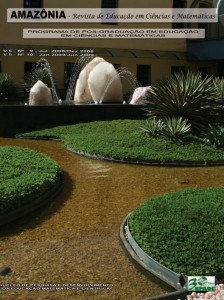The sense and the meanings of mathematics education in cases of exclusion and inclusion school and social at young and adult education
DOI:
https://doi.org/10.18542/amazrecm.v5i0.1720Keywords:
mathematics education, processes of exclusion and inclusion school and social, youth and adults educationAbstract
This investigation is framed in terms of qualitative research as a case study of students in a public school member of the special program of Youth and Adults - ETA. These students were enrolled in the 3rd and 4th stages of the program, whose curriculum format corresponds to the last four grades, from 5th to 8th grades, whose operation is concentrated knowledge, space and time as each step is developed in a school year. The chosen school is located in the geographic area of 'occupation' which the community lives in conditions of social exclusion, precisely in the vicinity of two public universities. Young and adults people this context, studying at the school, experienced a school career marked by impediments to study, school failures and interruptions that prevented them from completing the elementary school. For these reasons, we decided to investigate to learn under the teaching of mathematics, elements that contribute to inclusion in school with success for these students, as well as elements that ultimately relate to school exclusion, a phenomenon that feeds back the inevitable process of social exclusion of these students. To this end, we assume the construction of a narrative plot on the context of the school, involving and interacting dialogically their subjects in this study, namely, students, teachers and school staff. Consider their histories and their interpretations of events experienced by teaching them about the teaching of mathematics, aiming to produce other meanings, relationships and connections that meet the 'how' and 'why' analysis elements contribute outstanding and concern the process inclusion or exclusion from school. Analyses proceeded possible for us to show the terms of the indifference of the school and teachers unprepared either by ignoring the history of the students either by distorted view of "curriculum fair" and "equal opportunities" in comparison with students told legally bound to "regular education"References
ARAGÃO, R.M.R. A investigação narrativa no âmbito da história oral de ações escolares de ensino e de aprendizagem em aulas. São Paulo: PPGE/UMESP, 2000.
BRUNEL, C. Jovens cada vez mais jovens na educação de jovens e adultos. Porto Alegre: Mediação, 2004.
CONNELLY, F. M. e CLANDININ, D.J. Relatos de Experiência e Investigatión Narrativa, IN: Larrosa, J. (org): Dejame que te cuente: ensayos sobre narrativa e educatión. – Barcelona: Editorial Laertes, 1995.
D'AMBRÓSIO, U. Desafios da matemática no novo milênio. Palestra na I SIPEM. Educação Matemática em Revista. n. 11. dez/2001. São Paulo: Cortez, 2001.
FONSECA, Maria C. F. R. Educação matemática de jovens e adultos: especificidades, desafios e contribuições. coleção tendências em educação matemática. Belo Horizonte: Autêntica, 2002.
GASPARETTO, M.M. Ensino de matemática: Um processo excludente. In: BONETI, L.W. Educação exclusão e cidadania. 2.ed. Ijuí: UNIJUÍ, 2000. (Coleção Educação).
GONÇALVES, T. V. O. Ensino de ciências e matemática e formação de professores: marcas da diferença. Tese de Doutorado. Campinas: UNICAMP, 2000.
PAIS, L. C. Didática da matemática: uma análise da influência francesa. Belo Horizonte: Autêntica, 2001.
SPOSATI, A.O. Mapa da exclusão/inclusão social da cidade de São Paulo. São Paulo: Educ, 1996.
STOER, Stephen R; MAGALHÃES, A. M; RODRIGUES, D. Os lugares da exclusão social: um dispositivo de diferenciação pedagógica. São Paulo: Cortez, 2004.
TELLES, J.A. É Pesquisa é? Ah, não quero, não bem!: Sobre Pesquisa Acadêmica e sua relação com a prática do professor de línguas. Linguagem e Ensino, vol.5, n.2, 2002 (91-116). Texto Internet rle.ucpel.tche.br/php/edições/v5 n2/f_joao.pdf.



